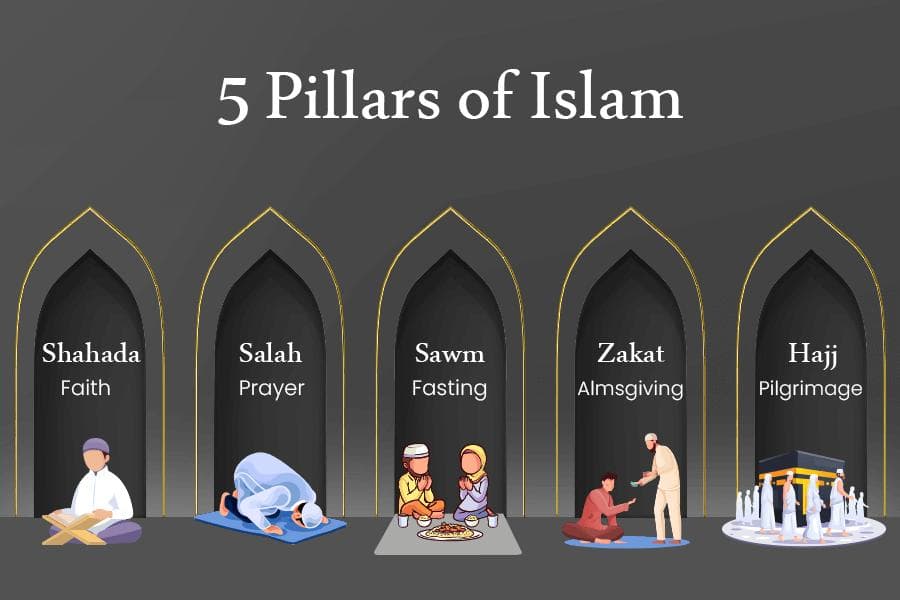Understanding the Five Pillars of Islam
By Future Rafay
•12/29/2024
•Islamic

Introduction to the Five Pillars of Islam
The Five Pillars of Islam are fundamental acts of worship that form the foundation of a Muslim's faith and practice. These pillars guide Muslims in their relationship with Allah (God), as well as in their social and moral responsibilities. Each pillar is essential in fulfilling the core aspects of Islam, serving as a framework that allows Muslims to embody faith in their daily lives.
1. Shahada (Faith)
The Shahada, or declaration of faith, is the most fundamental and important pillar of Islam. It is the proclamation that “There is no god but Allah, and Muhammad is the messenger of Allah” . This simple yet profound statement captures the essence of Islamic monotheism. By saying the Shahada, Muslims confirm their belief in the oneness of Allah, who is the Creator of the universe, and in Muhammad (PBUH) as the final messenger. This declaration is the entry point into Islam, and it reinforces the core belief in the oneness of God, a belief shared by all Muslims around the world.
2. Salah (Prayer)
Salah, or prayer, is the second pillar of Islam and is a direct link between the worshiper and Allah. Muslims are required to pray five times a day: at dawn (Fajr), midday (Dhuhr), mid-afternoon (Asr), sunset (Maghrib), and evening (Isha). These prayers are not only a form of worship but also an opportunity for Muslims to seek guidance, ask for forgiveness, and express gratitude to Allah. Each prayer involves a series of physical movements, such as standing, bowing, and prostrating, which are accompanied by specific recitations from the Qur'an. The consistency of performing Salah helps maintain a constant spiritual connection with Allah throughout the day.
3. Zakat (Charity)
Zakat is the third pillar and emphasizes the importance of charity in Islam. Muslims are obligated to give a portion of their wealth to those in need, ensuring that wealth is circulated within society and that the less fortunate are supported. The exact amount given is typically 2.5% of one’s accumulated wealth annually. Zakat is not seen as a donation but as a duty to help those who are less fortunate. By giving Zakat, Muslims purify their wealth and demonstrate their concern for the welfare of others. It promotes social equality and acts as a reminder of the temporary nature of material wealth.
4. Sawm (Fasting during Ramadan)
Sawm, or fasting, is observed during the month of Ramadan, the ninth month of the Islamic lunar calendar. Muslims fast from dawn until sunset, refraining from eating, drinking, smoking, and engaging in marital relations. The fast is not only a physical act of abstention but also a time for self-discipline, spiritual reflection, and empathy for the less fortunate. Ramadan is a time for increased devotion, prayer, and Quranic recitation. Fasting during Ramadan teaches Muslims to control their desires and develop patience, humility, and gratitude for the blessings of life.
5. Hajj (Pilgrimage to Mecca)
The fifth pillar of Islam is Hajj, a pilgrimage to Mecca that every Muslim must undertake at least once in their lifetime, provided they are physically and financially able. Hajj occurs during the Islamic month of Dhul-Hijjah and involves a series of rites performed over several days, including the Tawaf (the act of walking around the Kaaba), standing in Arafat, and the symbolic stoning of the devil. Hajj serves as a spiritual journey of purification and renewal, allowing Muslims to seek forgiveness for past sins and reaffirm their commitment to Allah. The pilgrimage unites Muslims from all over the world, promoting a sense of global brotherhood and equality.
Conclusion
The Five Pillars of Islam serve as the framework for a Muslim’s faith and practice. Each pillar reinforces the core teachings of Islam, helping Muslims to develop a closer relationship with Allah while fulfilling their obligations to society and the broader community. The Five Pillars are not merely ritualistic practices but essential elements of Islamic life that shape the moral, social, and spiritual well-being of Muslims around the world.
Comments
No comments yet. Be the first to comment!